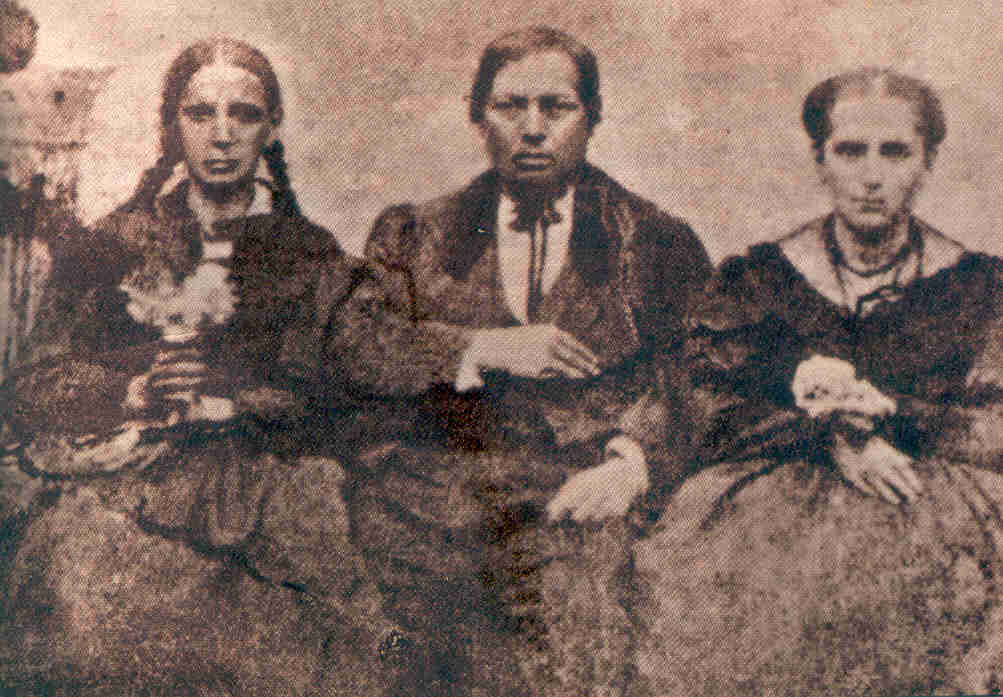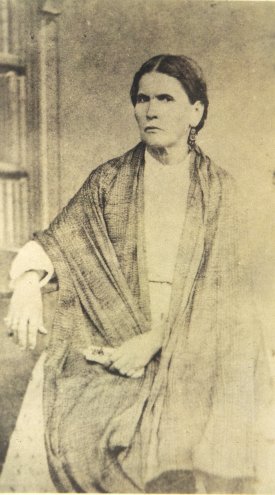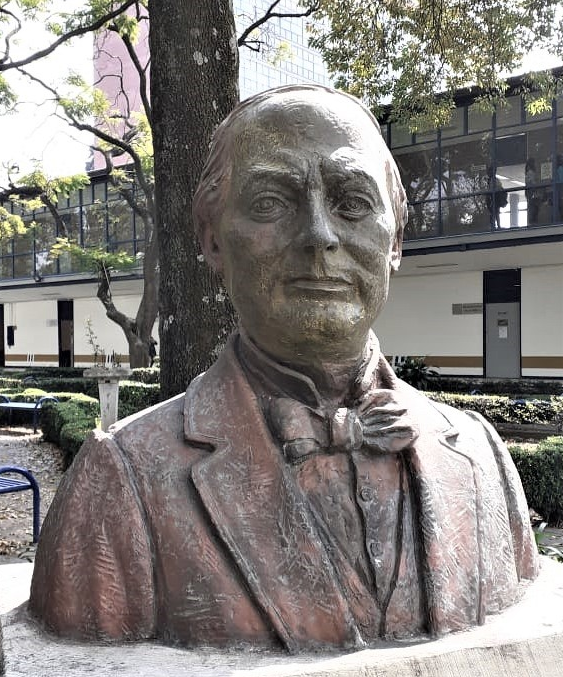|
1871 Mexican General Election
General elections were held in Mexico in 1871. In the presidential election, no candidate received more than 50% of the popular vote, resulting in Congress electing the winner. Having received 48% of the popular vote, incumbent president Benito Juárez was elected by Congress with 108 of the 116 votes cast.Mario Ramírez Rancaño (1977"Estadísticas electorales: presidenciales"''Revista Mexicana de Sociología'', Vol. 39, No. 1, pp271–299 Following the elections, losing candidate Porfirio Díaz launched a rebellion. Results President References {{Mexican elections Mexico General A general officer is an Officer (armed forces), officer of highest military ranks, high rank in the army, armies, and in some nations' air forces, space forces, and marines or naval infantry. In some usages the term "general officer" refers t ... Presidential elections in Mexico Election and referendum articles with incomplete results ... [...More Info...] [...Related Items...] OR: [Wikipedia] [Google] [Baidu] |
Benito Juárez
Benito Pablo Juárez García (; 21 March 1806 – 18 July 1872) was a Liberalism in Mexico, Mexican liberal politician and lawyer who served as the 26th president of Mexico from 1858 until his death in office in 1872. As a Zapotec peoples, Zapotec, he was the first Indigenous peoples of Mexico, indigenous president of Mexico and the first indigenous head of state in the postcolonial Americas. Born in Oaxaca to a poor rural family and orphaned as a child, Juárez was looked after by his uncle and eventually moved to Oaxaca City at the age of 12, working as a domestic servant. Aided by a lay Franciscan, he enrolled in a seminary and studied law at the Benito Juárez Autonomous University of Oaxaca, Institute of Sciences and Arts, where he became active in liberal politics. After his appointment as a judge, he married Margarita Maza, a woman of European ancestry from a socially distinguished family in Oaxaca City, and rose to national prominence after the ouster of Antonio López d ... [...More Info...] [...Related Items...] OR: [Wikipedia] [Google] [Baidu] |
Porfirio Díaz
José de la Cruz Porfirio Díaz Mori ( or ; ; 15 September 1830 – 2 July 1915), known as Porfirio Díaz, was a Mexican general and politician who served seven terms as President of Mexico, a total of 31 years, from 28 November 1876 to 6 December 1876, 17 February 1877 to 1 December 1880 and from 1 December 1884 to 25 May 1911. The entire period from 1876 to 1911 is often referred to as Porfiriato and has been characterized as a ''de facto'' dictatorship. A veteran of the War of the Reform (1858–1860) and the French intervention in Mexico (1862–1867), Díaz rose to the rank of general, leading republican troops against the French-backed rule of Maximilian I. He subsequently revolted against presidents Benito Juárez and Sebastián Lerdo de Tejada on the principle of no re-election. Díaz succeeded in seizing power, ousting Lerdo in a coup in 1876, with the help of his political supporters, and was elected in 1877. In 1880, he stepped down and his political ally Manuel ... [...More Info...] [...Related Items...] OR: [Wikipedia] [Google] [Baidu] |
President Of Mexico
The president of Mexico ( es, link=no, Presidente de México), officially the president of the United Mexican States ( es, link=no, Presidente de los Estados Unidos Mexicanos), is the head of state and head of government of Mexico. Under the Constitution of Mexico, the president heads the executive branch of the federal government and is the commander-in-chief of the Mexican Armed Forces. The current president is Andrés Manuel López Obrador, who took office on 1 December 2018. The office of the president is considered to be revolutionary, in the sense that the powers of office are derived from the Revolutionary Constitution of 1917. Another legacy of the Mexican Revolution is the Constitution's ban on re-election. Mexican presidents are limited to a single six-year term, called a '' sexenio''. No one who has held the post, even on a caretaker basis, is allowed to run or serve again. The constitution and the office of the president closely follow the presidential system of go ... [...More Info...] [...Related Items...] OR: [Wikipedia] [Google] [Baidu] |
Mexico
Mexico (Spanish: México), officially the United Mexican States, is a country in the southern portion of North America. It is bordered to the north by the United States; to the south and west by the Pacific Ocean; to the southeast by Guatemala, Belize, and the Caribbean Sea; and to the east by the Gulf of Mexico. Mexico covers ,Mexico ''''. . making it the world's 13th-largest country by are ... [...More Info...] [...Related Items...] OR: [Wikipedia] [Google] [Baidu] |
Congress Of The Union
The Congress of the Union ( es, Congreso de la Unión, ), formally known as the General Congress of the United Mexican States (''Congreso General de los Estados Unidos Mexicanos''), is the legislature of the federal government of Mexico consisting of two chambers: the Senate of the Republic and the Chamber of Deputies. Its 628 members (128 senators and 500 deputies) meet in Mexico City. Structure The Congress is a bicameral body, consisting of two chambers: The Senate of the Republic and the Chamber of Deputies. Its structure and responsibilities are defined in the Third Title, Second Chapter, Articles 50 to 79 of the 1917 Constitution. The upper chamber is the Senate, ''"Cámara de Senadores"'' or ''"Senado"''. It comprises 128 seats, 96 members are elected by plurality vote, with 3 members being elected in each State; the other 32 members are elected by proportional representation in a single country-wide constituency. The lower house is the Chamber of Deputies, or ... [...More Info...] [...Related Items...] OR: [Wikipedia] [Google] [Baidu] |
Plan De La Noria
The Plan de la Noria was a revolutionary call to arms intended to oust Mexican President Benito Juárez, who had been elected to a fourth term. Liberal General Porfirio Díaz issued it on 8 November 1871, immediately following his defeat by Juárez in the presidential election. Neither Juárez, Díaz, nor the third candidate, Sebastián Lerdo de Tejada, won a majority of votes. As a result, the Mexican Congress had to choose the victor; it was dominated by Juáristas and elected Juárez to his fourth term. Díaz drafted the Plan de la Noria demanding electoral freedom and no re-election. He gained some supporters from the army and enemies of Juárez, who supported Díaz for their own reasons. He was temporarily defeated by government forces in Oaxaca, where his brother Felix was killed. After President Juárez died of a heart attack in July 1872, his successor, Chief Justice Sebastián Lerdo, assumed the presidency and pardoned the rebels in an effort to stabilize the countr ... [...More Info...] [...Related Items...] OR: [Wikipedia] [Google] [Baidu] |
Sebastián Lerdo De Tejada
Sebastián Lerdo de Tejada y Corral (; 24 April 1823 – 21 April 1889) was Mexican liberal politician and jurist who served as the 27th president of Mexico from 1872 to 1876. A successor to Benito Juárez, who died in office in July 1872, Lerdo de Tejada was elected to his own presidential term in November 1872. Previously, he served as Chief Justice of the Supreme Court. Juárez's political rival, liberal General Porfirio Díaz, had attempted a coup against Juárez, but his Plan de la Noria failed and Díaz was eliminated as a political rival during Lerdo de Tejada's 1872–1876 term, giving him considerable leeway to pursue his program without political interference. During his term, he succeeded in pacifying the country after decades of political unrest and strengthening the Mexican state. He was elected for another term in 1876, but was overthrown by Porfirio Díaz and his supporters under the Plan of Tuxtepec, which asserted the principle of no-reelection to the presidenc ... [...More Info...] [...Related Items...] OR: [Wikipedia] [Google] [Baidu] |
1871 Elections In North America
Events January–March * January 3 – Franco-Prussian War – Battle of Bapaume: Prussians win a strategic victory. * January 18 – Proclamation of the German Empire: The member states of the North German Confederation and the south German states, aside from Austria, unite into a single nation state, known as the German Empire. The King of Prussia is declared the first German Emperor as Wilhelm I of Germany, in the Hall of Mirrors at the Palace of Versailles. Constitution of the German Confederation comes into effect. It abolishes all restrictions on Jewish marriage, choice of occupation, place of residence, and property ownership, but exclusion from government employment and discrimination in social relations remain in effect. * January 21 – Giuseppe Garibaldi's group of French and Italian volunteer troops, in support of the French Third Republic, win a battle against the Prussians in the Battle of Dijon. * February 8 – 1871 French legislative election elects t ... [...More Info...] [...Related Items...] OR: [Wikipedia] [Google] [Baidu] |
1871 Elections In Mexico
Events January–March * January 3 – Franco-Prussian War – Battle of Bapaume: Prussians win a strategic victory. * January 18 – Proclamation of the German Empire: The member states of the North German Confederation and the south German states, aside from Austria, unite into a single nation state, known as the German Empire. The King of Prussia is declared the first German Emperor as Wilhelm I of Germany, in the Hall of Mirrors at the Palace of Versailles. Constitution of the German Confederation comes into effect. It abolishes all restrictions on Jewish marriage, choice of occupation, place of residence, and property ownership, but exclusion from government employment and discrimination in social relations remain in effect. * January 21 – Giuseppe Garibaldi's group of French and Italian volunteer troops, in support of the French Third Republic, win a battle against the Prussians in the Battle of Dijon. * February 8 – 1871 French legislative electi ... [...More Info...] [...Related Items...] OR: [Wikipedia] [Google] [Baidu] |
Presidential Elections In Mexico
President most commonly refers to: *President (corporate title) *President (education), a leader of a college or university * President (government title) President may also refer to: Automobiles * Nissan President, a 1966–2010 Japanese full-size sedan * Studebaker President, a 1926–1942 American full-size sedan * VinFast President, a 2020–present Vietnamese mid-size SUV Film and television *'' Præsidenten'', a 1919 Danish silent film directed by Carl Theodor Dreyer * ''The President'' (1928 film), a German silent drama * ''President'' (1937 film), an Indian film * ''The President'' (1961 film) * ''The Presidents'' (film), a 2005 documentary * ''The President'' (2014 film) * ''The President'' (South Korean TV series), a 2010 South Korean television series * ''The President'' (Palestinian TV series), a 2013 Palestinian reality television show *''The President Show'', a 2017 Comedy Central political satirical parody sitcom Music *The Presidents (American soul band) *The ... [...More Info...] [...Related Items...] OR: [Wikipedia] [Google] [Baidu] |





_(LOC)_-_Flickr_-_The_Library_of_Congress.jpg)